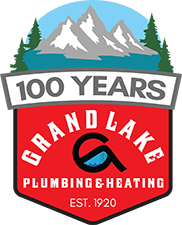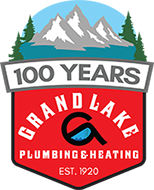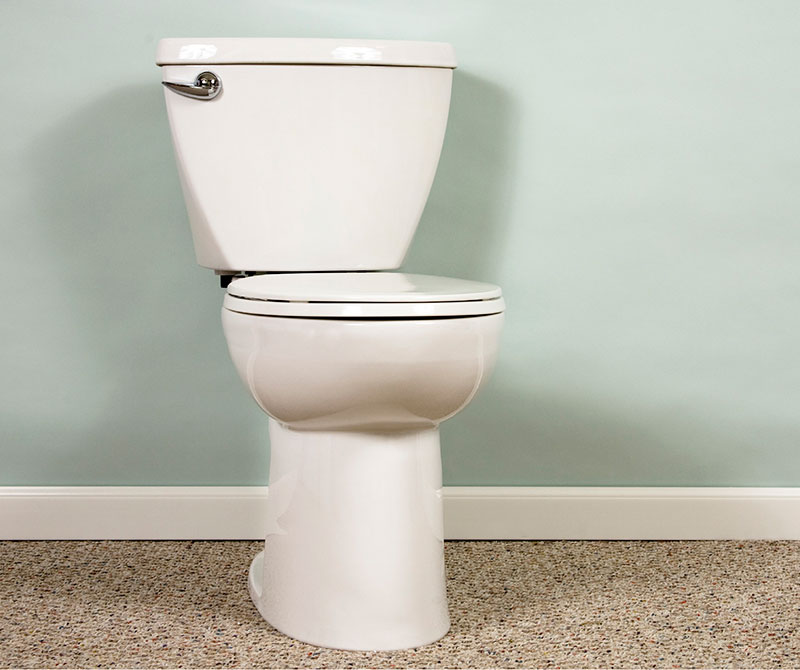
Plumbing Tips (126)
3 Tips to Make Your Water Heater Last Longer and Work More Efficiently
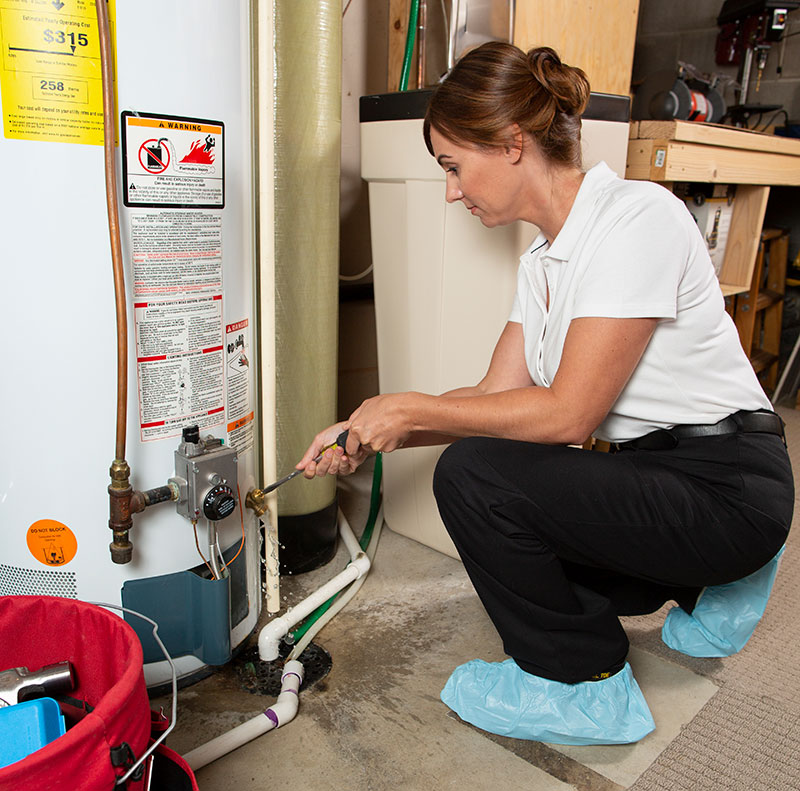
Many homeowners invest in a conventional tank water heater and often overlook it until it malfunctions or completely fails – often prematurely. However, adopting a few simple maintenance practices can not only extend the lifespan of your water heater but also enhance its efficiency. At Grand Lake Plumbing & Heating in Grand County, we recommend the following essential tips to keep your water heater in optimal condition.
Water Heater Maintenance Tips:
Annually Flush Your Water Heater Tank
Most manufacturers advise flushing your water heater tank each year. This process involves draining the tank to eliminate any sediment that has accumulated at the bottom. Removing this sediment is crucial as it ensures that the heating element can operate more efficiently, thereby reducing heating time and energy consumption.
To properly drain your water heater, refer to the manufacturer’s specific instructions for your model. This will ensure that you perform the flush properly and safely. If you prefer, Grand Lake Plumbing and Heating can flush the tank for you.
Inspect and Replace the Anode Rod as Needed
The anode rod is an important component of your water heater, designed to prevent the internal corrosion of the tank. This rod should be inspected annually—preferably during the tank's flushing process. If you find the anode rod to be significantly corroded, replacing it is generally more cost-effective than risking irreversible corrosion damage to your water heater.
A functional anode rod significantly prolongs the life of the water heater by preventing the rapid corrosion of the tank’s interior due to hot water exposure.
Insulate Your Water Heater Tank
Insulating your water heater tank is a one-time action that can boost its efficiency significantly. A water heater blanket wraps around your tank, reducing the heat lost to the surrounding environment. This means less energy is needed to maintain the water temperature, thereby enhancing overall efficiency.
Be sure to use a product specifically designed for insulating water heaters and install it properly to avoid blocking access to controls and ventilation.
Bonus Tip: Reduce Your Hot Water Usage
Although not directly maintenance related, minimizing hot water usage can decrease the demands on your water heater, leading to a longer lifespan and reduced maintenance needs. Installing low-flow showerheads and opting for cold water settings when washing clothes can significantly cut down hot water use.
Have questions about maintaining your home's water heater? Contact Grand Lake Plumbing & Heating—we have over 100 years of experience servicing hot water systems.
Spring Home Plumbing Maintenance Tips
Springtime in Grand County, Colorado, brings not just the beauty of blooming alpine flowers and melting snow but also the need for homeowners to ensure their plumbing systems are ready for the warmer months ahead. At Grand Lake Plumbing & Heating, we understand the unique challenges our climate can present for our home's plumbing systems. That's why we've compiled a comprehensive spring plumbing checklist for you. Following this guide will help ensure your home’s plumbing system functions smoothly, saving you from unexpected repairs and costs.
Check for Leaks
Inspect all exposed pipes under sinks and in the basement for signs of leaks. Look for puddles, water stains, or mold. A common cause of leaks is frozen pipes that have cause undetected damage.
Test Your Sump Pump
Spring thaw can put your sump pump to the test. Pour a bucket of water into the sump pit to ensure it's working correctly. Listen for any unusual noises and ensure the water is being ejected away from your home.
Ensure Plumbing Systems Are Regularly Used
If your home is unoccupied for significant periods of time, remember to exercise faucets, toilets and water valves under sinks and toilets will prevent them from sticking and keep them in good condition.
Water Heater Maintenance
Drain and flush your water heater to remove sediment buildup, which can reduce efficiency and lifespan. Check the temperature setting (120°F is ideal for energy efficiency and safety).
Inspect Toilet Flappers and Fill Valves
Leaky toilets can waste a significant amount of water. Check for signs of wear or breaks and test for silent leaks by adding a few drops of food coloring to the tank and waiting to see if the color appears in the bowl.
Check for Hard Water Buildup
Grand County's water can be hard, leading to mineral buildup in your fixtures and appliances. Soak shower heads and faucets in vinegar to remove deposits. If hard water is a concern, consider installing a water softener or reverse osmosis water filtration system.
Inspect Outdoor Faucets and Hose Bibs
After a cold Grand County winter, checking for freeze damage is crucial. Turn on each outdoor faucet to ensure water flows freely and closes securely without leaks.
When to Call a Professional Plumber
While many spring plumbing tasks can be DIY, there are times when calling in a professional plumber from Grand Lake Plumbing & Heating is the best course of action:
Major Leaks or Burst Pipes
If you discover significant leakage or suspect a burst pipe, it's important to call a professional immediately to prevent further damage.
Sewer Line Issues
If you notice foul odors, slow drains throughout the house, or water backing up, you might have a sewer line problem. These issues require professional equipment and expertise.
Water Heater Problems
If your water heater is leaking, making strange noises, or not providing enough hot water, it's time for a professional inspection. Water heaters can be complex and potentially dangerous to work on without proper training.
Installation of New Fixtures or Appliances
To ensure proper installation and avoid future problems, have a professional handle the installation of new plumbing fixtures or water-using appliances.
Remodeling Projects
Any plumbing involved in kitchen, bathroom, or basement remodeling should be handled by a professional to ensure it meets local building codes and standards.
At Grand Lake Plumbing & Heating, we're here to ensure your plumbing system is in top condition for spring and beyond. Whether you need help with routine maintenance winterization, repairs, or emergencies, our team of experienced professionals is just a call away.
Choosing the Best Garbage Disposal

Time to replace your old under sink garbage disposal? Choosing the right garbage disposal can make a world of difference in your kitchen's functionality and efficiency. With so many models, brands, and features available, the selection can be overwhelming. There are a number of factors to you'll want to consider, including durability, noise levels, price, and brand reputation.
Here's a guide to help you make an informed decision and choose the best disposal for your needs.
Types of Garbage Disposals
There are mainly two types:
Continuous Feed
The most common type, it operates as long as the switch is on. It's user-friendly, but ensure you run water during the process to prevent jamming.
Batch Feed
As the name implies, this type allows you to put food waste in all at once, typically around 5 cups,. It usually requires a cover to operate, ensuring safety as it won’t run until it's securely in place. The cover makes it a good choice for households with children.
Horsepower
1/3 Horsepower is the starting point for disposals, offering the lowest power and lowest cost. While they can seem like a bargain, we recommend avoiding low-power disposals. They will be more prone to jamming and are often made from lower quality components that wear out more quickly.
1/2 horsepower garbage disposals are the minimum rating recommended for a home disposal. They are widely available, affordable and compact enough to fit in tight spaces. If you don't use a disposal that often and don't mind the higher noise levels of a smaller disposal, a 1/2 horsepower unit may be a good option. Choose a disposal with stainless steel grinding components, they will resist rusting and wear and tear longer, increasing the lifespan of the unit.
For many households, a 3/4 horsepower disposal will work best. They have plenty of power to handle those large holiday gatherings and can safely grind potato peels, celery and more without complaint. While they require more space under the sink than lower power units, they are typically quieter.
Have a large family or do a lot of cooking and entertaining? Consider upgrading to a 1 horsepower disposal. They can handle just about anything you can throw at them. With a large grinding chamber and premium stainless steel components they make quick work of everything from chicken and fish bones to fruit rinds.
1 horsepower units are the top-of-the-line, just make sure you have the room under your sink!
Whatever size unit you decide to purchase, it's important to always run lots of water when grinding waste to ensure that residue does not build up inside the girding chamber.
Have questions about selecting the right garbage disposal for your kitchen? Call Grand Lake Plumbing & Heating. We can help you choose the right disposal for your needs.
More...
Water Heater Troubleshooting Guide
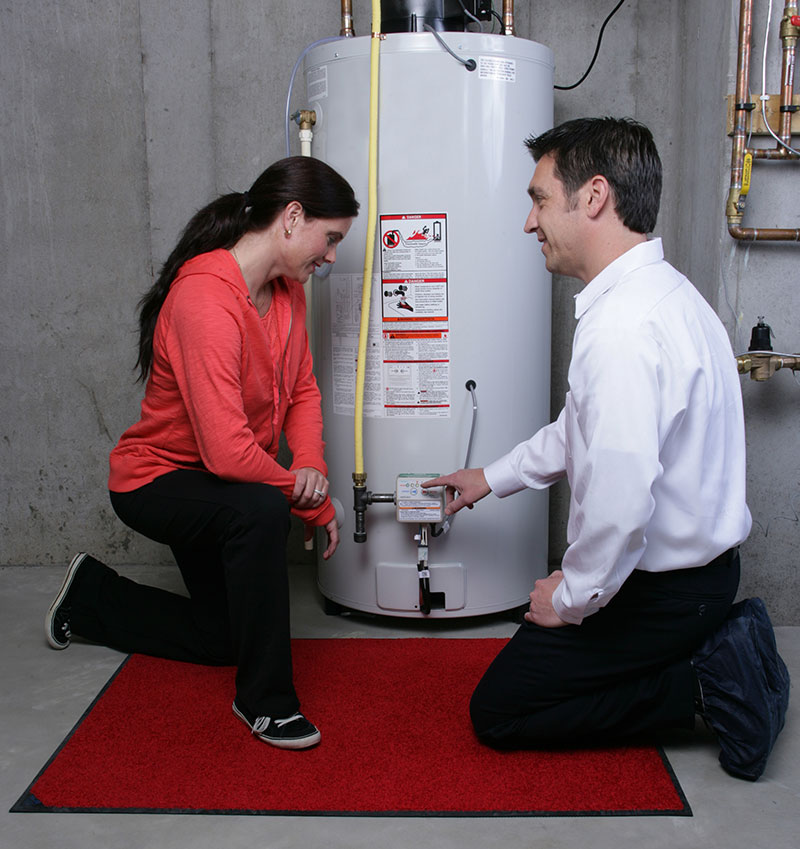
Most of us havel faced it—a chilly morning shower, strange noises from the water heater, or an unexpected spike in the utility bill. But did you know that most water heater problems have simple solutions? We have put together a troubleshooting guide to help with the most common issues you are likely to encounter.
No Hot Water
Possible Causes:
- Tripped circuit breaker
- Faulty thermostat
- Malfunctioning heating element
Solutions:
- Reset the circuit breaker
- Check and replace the thermostat if necessary
- Inspect the heating element. If damaged, the water heater will need to be replaced
Running Out of Hot Water
Possible Causes:
- Undersized water heater for your home's needs
- Sediment build-up at the bottom of the tank
- Broken or malfunctioning dip tube
Solutions:
- Consider upgrading to a larger capacity heater
- Drain and flush your heater to remove sediment
- Check and replace the dip tube if damaged
Water Discoloration
Possible Causes:
- Rusty anode rod
- Sediment accumulation in tank
- Poor water quality
Solutions:
- Replace the anode rod
- Drain and flush the tank to remove sediment
- Have your home's water tested for excessive iron or other contaminents
Bad Water Taste
Possible Causes:
Old tank or decaying anode rod
Bacterial contamination for low tenk temperature
Solutions:
Check and replace the anode rod.
Disinfect your tank with a bleach solution and flush thoroughly.
Water Heater Noises
Possible Causes:
- Sediment build-up causing popping or rumbling
- Expansion and contraction of heating elements
Solutions:
- Drain and flush your heater to clear out sediments
- If the noise persists, consult a plumber
High Utility Bills
Possible Causes:
- Inefficient or old water heater model
- External leaks or damaged insulation
Solutions:
- Consider upgrading to a more energy-efficient model
- Check for leaks and repair. Insulate the heater and pipes to conserve energy
Water On Or Around Water Heater
Possible Causes:
- Leaky valves
- Tank corrosion or damage
Solutions:
- Inspect valves and tighten or replace as necessary
- If the tank is corroded, it's time for a replacement
If you're experiencing water heater problems, call Grand Lake Plumbing and Heating. Our experienced plumbers can quickly diagnose the problem and recommend solutions for repairs or, when needed, water heater replacement.
A Step By Step Guide to Buying a New Water Heater
Expert Hot Water Tips for Homeowners
Water heaters are essential home appliances we rely on all day long, but they aren’t something we think about until they malfunction and the hot water tap runs cold. If you’re in the market for a new one, this guide will help you make the right choice for your home. Let's dive right into it!
Why is Choosing the Right Water Heater Important?
Water heaters aren’t just about getting hot water. Choosing the right unit impacts your energy bills and ensures you get a consistent supply of hot water whenever you need it. As you'll see below, there are different types of water heaters for different needs.
Step 1: Determine Your Needs
Evaluate Your Daily Hot Water Usage
Estimate how much hot water your household uses daily. Consider the number of people, daily routines, and peak times for water usage.
Understand Your Home's Infrastructure
Is your home set up for gas, electric, or both? The infrastructure will dictate the type of heater you can install.
Step 2: Choose the Type of Water Heater
Storage Tank Heaters
The most common type. They consist of an insulated tank where water is heated and stored until needed.
Tankless Water Heaters
These heat water directly without using a storage tank. They’re energy-efficient but might not be the best for large families.
Heat Pump Heaters
Rather than generating heat directly, they move heat from one place to another. These are best for homes in warmer climates.
Step 3: Look at Energy Efficiency Ratings
Higher energy efficiency means lower monthly bills. Check the Energy Guide label on the unit. It can provide estimated yearly operational costs and compare its efficiency with other models.
Step 4: Decide on the Right Size
For Storage Tank Heaters
Choose a unit based on the number of gallons the tank holds and how quickly it heats the water.
For Tankless Heaters
Look at the gallons-per-minute (GPM) rate. Ensure it can handle your household's peak demand.
Step 5: Consider the Warranty
Most water heaters come with warranties ranging from 3 to 12 years. While a longer warranty is better, it might also mean a slightly higher price.
Step 6: Factor in Installation Costs
Remember, the purchase price of your heater isn’t the only cost. Installation can vary depending on the complexity of the job. Tankless water heaters are typically more costly to install.
Choosing a new water heater might feel overwhelming, but by starting with the questions above you'll have a head start when hiring a plumber to replace your water heater.
Bathroom Renovation: Essential Plumbing Tips & Considerations
Bathroom Renovation: Plumbing Considerations to Keep in Mind
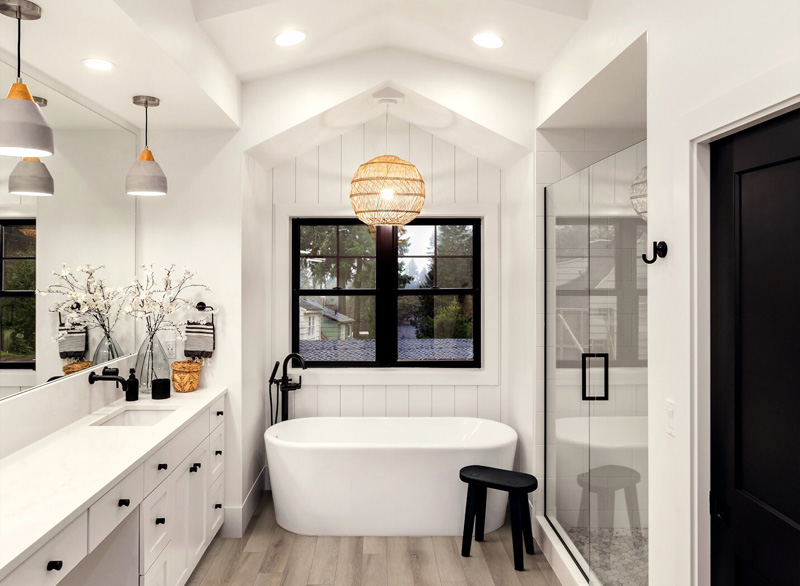
Bathroom renovations not only enhance the aesthetic appeal of your home but can also significantly increase its resale value. While it's easy to get caught up in choosing the right aesthetic, such as the perfect tiles or fixtures, it's important to not overlook underlying the plumbing system. Not upgrading the plumbing can lead to long-term issues. In this article, we'll take a look at the crucial plumbing considerations you should bear in mind when remodeling your bathroom.
Assessing the Existing Plumbing System
Checking for Old Pipes
Before you start any renovation, it’s imperative to have a professional plumber inspect your existing plumbing. Older homes often have galvanized or lead pipes, which might need replacement due to corrosion or health concerns.
Testing Your Water Pressure
It's also important to test your home's water pressure. If it’s too high, it can damage your fixtures and pipes. On the other hand, low water pressure might indicate blockages or leaks. If you have a well, it's important to have your pressure tank inspected to ensure it is working correctly and maintaining optimum pressure.
Choosing the Right Fixtures
Selecting Water-Efficient Models
Modern fixtures, like low-flow toilets and faucets, can save a significant amount of water without compromising on functionality. Look for shower heads, toilets and faucets with the WaterSense label
Ensuring Compatibility with Existing Plumbing
Ensure that the fixtures you choose are compatible with your home's plumbing system. For example, some luxury shower heads with multiple spray systems may require a specific water pressure range to function optimally.
Your plumber must ensure that the fixture's inlet matches the size of your existing pipes. If there's a mismatch, it might lead to reduced water flow or leaks. The material of your pipes must also be considered. When combining PVC pipes with copper fixtures the appropriate connectors must be used to ensure compatibility.
Venting and P-Trap Placement
When relocating fixtures, remember that each one will need proper venting and a correctly positioned P-trap to prevent sewer gases from entering your home.
Other Potential Challenges
Space Limitations
In smaller bathrooms, you might face limitations when positioning fixtures and ensuring that they have the required spacing. By work closely with a plumbing expert you can ensure that your needs are met while limiting compromises.
Future-Proofing Your Plumbing
Anticipating Future Needs
Think about your houshold's potential future needs. Will your family be growing? Are you planning on aging in place? Consider accessible fixtures that are easy to operate, have anti-scald devices and ensure there is easy access for walk-in showers during your renovation.
Hiring a Professional Plumber
While DIY can lead to the satisfaction of a job well done, it can also be a path to disappointment when things don't go as expected. Before making any decisions, get an expert's opinion. A plumber can guide you on what fixtures will work best with your existing plumbing and help make sure that systems are up to code.
While the design and aesthetics of your bathroom renovation are what homeowners focus on, it's the underlying plumbing that can make or break your bathroom remodeling project. The experienced plumbers at Grand Lake Plumbing are here to answer all your questions and can help ensure a successful, problem-free bathroom remodel.
Environmentally Friendly Ways To Keep Your Drains Clean
Avoid Harsh Chemical Drain Cleaners With These Safer DIY Alternatives

Ever read the warning labels on a container of store bought drain cleaner? You'll find chemicals like lye, sodium hypochlorite, sodium nitrate, sodium sulfate and more.
While these ingredients can be highly effective, they're also corrosive and can cause skin and eye irritation or damage if not handled very carefully. They can also be harmful if inhaled or ingested, so it's crucial to use these products away from young children and pets.
These common drain cleaning chemicals can also be damaging to the environment and the water supply, so it's important to use them responsibly and sparingly. Or, better yet, why not try a safer, environmentally save alternative the next time you have a minor clogged drain?
Baking Soda and Vinegar: This is a classic, natural method that works on small clogs. Pour half a cup of baking soda down the drain, followed by half a cup of vinegar. Wait 15-20 minutes and then rinse with hot water.
Hot Water and Dish Soap: For grease clogs in the kitchen, you can try hot water and dish soap. Pour a good squirt of dish soap down the drain, followed by a pot of boiling water. This can help loosen and dislodge grease clogs.
Salt, Borax, and Vinegar: Mix 1/4 cup of salt, 1/4 cup of borax, and 1/2 cup of vinegar, and pour it down the drain. Let the mixture sit for about an hour, then rinse it away with hot water. This can help dissolve some types of clogs and prevent the growth of bacteria in your pipes.
Enzyme-based Drain Cleaners: Enzyme-based drain cleaners, like Bio-Clean Drain Septic Bacteria or Earthworm Drain Cleaner, use natural enzymes or bacteria to break down clogs. They're a safer option for your pipes and for the environment, but they might take longer to work compared to chemical cleaners.
It's important to remember that even these environmentally friendly methods need to be used with care. Avoid overusing them or using them on large or persistent clogs, as this could potentially damage your pipes over time. And always remember, if a clog persists or keeps returning, it's best to call in a professional plumber. Professional drain cleaning can remove the toughest clogs and remove the residue deep inside the drain lines that can cause clogs to keep reforming.
Important Questions to Ask Before Hiring a Plumber

We often don't think about our home's plumbing system until things go wrong. When there's a major leak, a backed up drain, or other issue, and you need to find a plumber fast. To ensure you're hiring the right plumbing company for the job, it's important to ask potential plumbers a few key questions. Here are some of the most essential ones to consider:
Are You Licensed?
This is the first and foremost question you should ask. A licensed plumber has met all state and local requirements, which usually include passing an exam and proving a certain amount of professional experience. Hiring a licensed plumber ensures you're getting someone who knows the ins and outs of the industry.
Are You Insured?
It's important to hire a plumber who carries proper insurance. This protects both you and the plumber in case there's an accident or damage during the job. They should have liability insurance, and if they have a team, worker's compensation insurance is also necessary.
Do You Provide Upfront Cost Estimates?
No one likes surprise fees or costs. A reputable plumber should be able to provide you with an accurate estimate for the job upfront. The estimate should include the cost of labor but also parts and potential contingencies should the repair require more time than expected.
What Experience Do You Have with My Specific Problem?
Not all plumbing issues are created equal. Some companies will have more experience and expertise when it comes to sewer line repairs, while others will be a better option for digging wells. You want to ensure the plumber you're hiring has specific experience with your type of issue. Whether it's a clogged drain, a water heater problem, or a complete bathroom renovation, your plumber should have relevant experience.
Can You Provide References?
A reputable plumbing company should be able to provide references from previous clients who had similar work done. This allows you to get a sense of the plumber's work quality and customer service. It's also important to check online reviews from reputable consumer websites such as BBB, Angie and other review sites to get an idea of the kind of service you can expect.
Do You Offer a Warranty or Guarantee?
A reputable plumber will stand behind their work. They should offer some sort of guarantee or warranty on the work they perform. Be sure to ask what this covers, and for how long the guarantee or warranty is valid. Also ask about any manufacturer warranties for new equipment like water heaters.
Who Will Be Doing the Work?
If you're hiring from a larger plumbing company, the person you're talking to might not be the one doing the work. Ask who will be performing the tasks, and make sure they're also licensed and insured.
How Do You Handle Payment?
Understanding the payment schedule is important for avoiding confusion or disputes. Some plumbers require a deposit upfront, while others don't require payment until the job is complete. Always get the payment terms in writing.
By doing your research and asking these questions you can reduce the likelihood of problems or disputes and improve the chances of have a good experience for you next plumbing service call.
Backflow Prevention Devices For the Home

Backflow is hazardous condition in a plumbing system where non-potable water is siphoned into the drinking water supply. To prevent backflow a plumbing system must be designed properly and have backflow prevention devices installed. Here are examples of backflow prevention devices found in homes.
Atmospheric Vacuum Breaker (AVB)
Back-siphonage occurs when the system pressure drops, thereby forcing the pressure to become high to make up for the difference. When the pressure in the potable water system drops, it is possible that non-potable outflow can backflow into the system. This is where AVB is used to prevent the process of back-siphonage. AVBs comprise of an air inlet port, a check seat, and an air inlet valve.
Double Check Valves
These valves are designed to prevent backflow from two sources. They are typically installed in a series, with one valve installed upstream and one installed downstream. The valves work by allowing water to flow in one direction, while preventing backflow in the other direction.
Pressure Vacuum Breaker Valves (PVBs) - These valves are designed to prevent backflow from a pressurized water system. They work by allowing air to enter the system when the pressure differential rises, preventing backflow.
What is the difference between a backwater valve and a backflow preventer?
A backwater valve is a kind of prevention device used in plumbing systems to prevent sewage water from flooding the bathroom or basement. Backwater valves are installed at the lowest point of the sewage line. Backflow preventers, on the other hand, are mechanical devices used to prevent backflow of contaminated or polluted water from entering the water main. They are installed at the end of a pipe, typically at the point where the water enters the main supply line. Backflow preventers are required in regions where there is a risk for contaminants entering the public water supply.
Should you install backflow prevention devices in your home?
While not all municipalities in Colorado require backflow prevention devices in residential plumbing systems, we recommend that all homes have backflow devices installed, particularly homes with private wells. It's relatively inexpensive to add the devices to your plumbing system and can help ensure that your drinking water is safe from contamination.
Do You Need A Water Heater Expansion Tank?
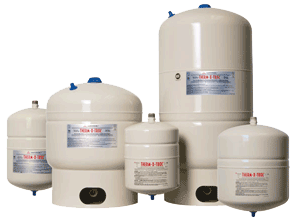
What Is a Water Heater Expansion Tank?
A water heater expansion tank is a small tank, typically located near or above your water heater, which serves to collect and store any expanded water due to increasing pressure when the water temperature is rising. This helps keep the pressure inside the water heater from rising too high and also reduces the amount of water that can be lost due to thermal expansion. This helps increase the efficiency and extend the life of your water heater and helps to prevent damage to your plumbing system.
Because water will expand when heated, the excess pressure inside the water heater tank needs to be released. In the past, the expanding water in the tank would simply drain back out into the municipal water supply where it came from. Today, the water main is designed to prevent the backwards release of pressure, known as backflow, by employing a check valve. The check valve prevents waste water from inside the house returning to the water supply where it can contaminate the supply of fresh water.
A water heater expansion tank is another small tank that is attached to the water supply pipe of the water heater. The expansion tank is designed to handle the thermal expansion of water as it heats up in the water heater, preventing excessive water pressure. If water pressure gets to high it can damage valves in plumbing fixtures, joints in supply pipes and the water heater itself. Expanding water from the water heater flows into the expansion tank, relieving water pressure in the system.
What if my water heater doesn't have an expansion tank?
Most homes that have a check valve on the water main do not have an expansion tank, since it wasn't required until recently. This may or may not cause excessive pressure buildup, depending on the specific design of the plumbing in the house.
If you are noticing that washers in plumbing fixtures are deteriorating rapidly, or water is dripping from the relief valve on the water heater, you may need add an expansion tank. It can be low cost insurance against more costly damage to your home's plumbing system. Grand Lake Plumbing and Heating can help you determine what kind of expansion tank is right for your water heater.
What to Do When Broken Glass Falls Into a Garbage Disposal
What to Do When Broken Glass Falls Into a Garbage Disposal

Breaking a glass in the sink while doing the dishes is a pretty common occurrence. Unfortunately, little bits of broken glass can fall into the garbage disposal, where they can be tricky to remove. It's important to turn off the disposal immediately when you hear and loud noises to prevent damaging the unit. The good news is that there are steps you can take to safely and effectively remove the broken glass so it does not end up being ground up in the disposal chamber. Here's how to remove the broken glass.
Safety First
Before attempting to remove the glass, it’s important to ensure the power to the disposal is turned off. Usually you can simply, unplug the disposal from the outlet located under the sink. If the unit can not be unplugged, you can turn off the power to the kitchen from the home's electrical panel by switching the circuit breaker to the "off" position.
Removing the Glass
To remove the glass you’ll need a pair of safety glasses and a pair of long-handled tongs or pliers. The safety glasses will protect your eyes from any flying glass, and the tongs will help you reach into the disposal to pull out the larger bits of glass.
Cleaning the Disposal
Once the larger bits of glass are out of the disposal, you will need to remove the smaller particles of glass. First, put on heavy rubber gloves to protect your hands. Next, take a damp sponge with a few drops of dish soap and carefully wipe the inside of the chamber to pick up the smaller glass particles. Once the chamber is as clean as possible, flush the disposal (power off) with warm water to dislodge any remaining fine glass particle.
When to Call a Plumber
If the glass has jammed in the impeller of the disposal, it is best to call a professional plumber. A plumber will have the tools and experience to safely and effectively remove the glass to prevent damaging the unit.
Plumbing For Hot Tubs
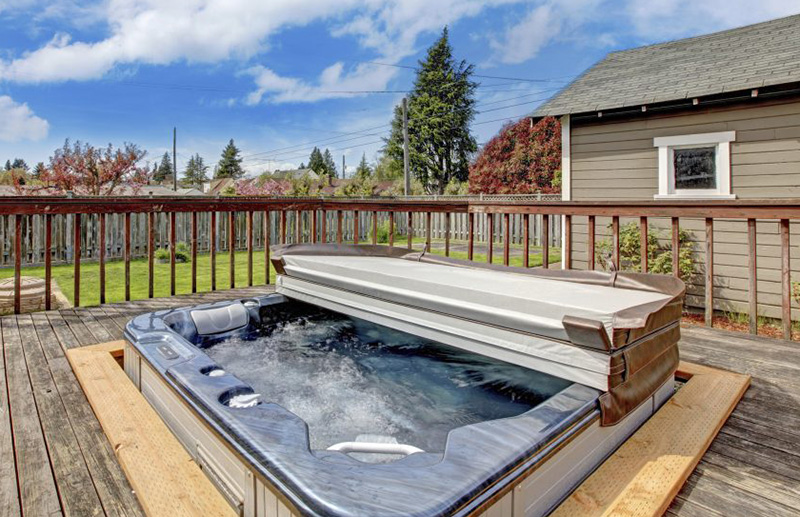
In the Colorado mountains, there are few things more luxurious than relaxing in a hot tub after a long day of winter activities. Hot tubs provide a spot to host family and friends, adding a wonderful mountain retreat vibe to your outdoor space. While having a hot tub can be fun, there are a few plumbing requirements you will need to consider in order to ensure it is installed safely and correctly.
First, your hot tub must be connected to a dedicated circuit breaker with a Ground Fault Circuit Interrupter (GFCI). This is a safety device that will shut off the power if there is an electrical fault. Second, you must have a dedicated shut-off valve for the hot tub. This will allow you to easily turn off the water supply to the hot tub if repairs are needed.
For the plumbing, you will need to have a dedicated water supply line to your hot tub. This will ensure that the hot tub is getting the right amount of water and pressure. A plumber will also need to install a dedicated waste line. This will allow the water to be safely drained away from the hot tub.
Do I need to hire a plumber to install a hot tub?
Yes, it is recommended that you hire a professional plumber to install your hot tub. A plumber will ensure that all of the necessary plumbing requirements are met. Hiring a plumber to install your hot tub will help you to avoid any potential issues and ensure your hot tub is installed correctly.
What are the plumbing considerations for installing a hot tub in a cold climate like Colorado?
There are a few additional plumbing considerations that must be taken into account. The water lines should be insulated to prevent them from freezing during the winter months. It's also recommended that a freeze protection timer be installed. The timer will turn the hot tub on and off automatically to prevent freezing.
How To Choose a New Water Heater

Has your old water heater stopped providing enough hot water? Does it show signs of corrosion or leaks? If so, it's time to start looking for a replacement. On average, a gas water heater will last around 8 years. With regular maintenance, which includes flushing the tank annually, you may be able to extend its lifespan to 12 years or more.
Choosing a new water heater
Here are the questions to consider when buying a new water heater:
- Will it be a gas or electric water heater?
- Do I want a tank-style water heater, or a tankless water heater?
- If it's a tank water heater, you will need to consider what capacity you will need
- What it the warranty?
- It's also important to consider efficiency, which you can find out by researching manufacturer websites
Consider Upgrading To a Tankless Water Heater
Tankless water heaters have several advantages over traditional tank-based models. The biggest advantage is that they provide a constant supply of hot water on demand, so you don't need to wait for the tank to refill. This makes tankless units a great option for large households that would otherwise need a very large water heater tank to avoid running out of hot warer.
Tankless systems are more energy efficient and have a longer lifespan than traditional water heaters. However, they are more complex and cost more to install, so make sure you factor this into your decision.
Once you have a general idea of what you need, your plumber can help you with other considerations, such as installation requirements, gas line connections, as well as any permits or inspections that may be required. They can also help select the best location for the water heater, such as near the kitchen or master bath.
Have questions about water heaters? Give Grand Lake Plumbing & Heating a call. We can help answer all your plumbing questions.
How Hard Water Can Cause Problems With Your Home's Plumbing System
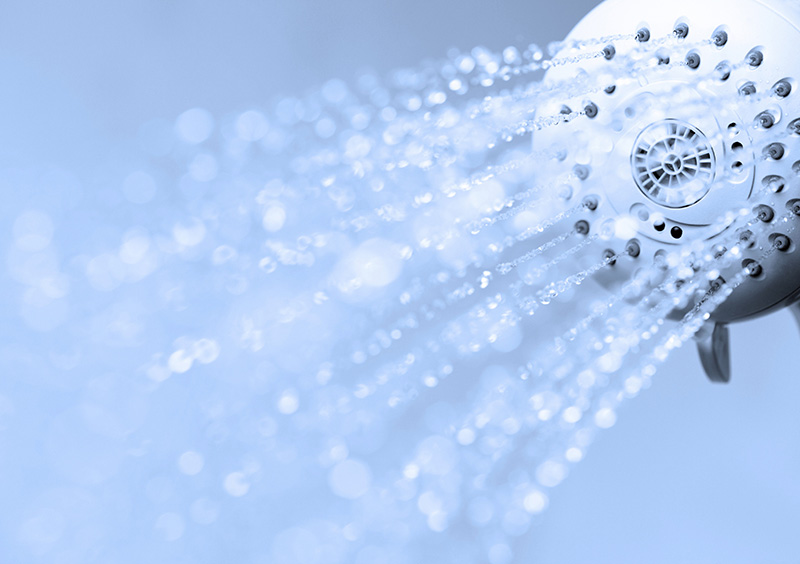
Hard water can cause problems for homeowners in both increased energy usage and a shortened lifespan of appliances. The two minerals most commonly found in hard water, calcium and magnesium, make heating water less efficient. It requires more energy to heat mineral heavy water compared to clear, purified water.
Hard water can also cause limescale build-up, drastically restricting the water flow in your pipes. Steel pipes are the most prone to this problem, copper and PVC are not as susceptible to limescale build up. Over time this scale build up can lower water pressure in your home's plumbing, eventually leading to costly damage to pipes and plumbing fixtures. As the flow in pipes becomes more restricted, the limescale buildup will happen at a faster rate.
The areas that you may first notice mineral build up are in areas around shower heads, plugs, faucets and valves. Slowly dripping faucets can cause scale build up on sink surfaces and could damage the rubber washers that are required to keep the mechanism water tight. If this occurs, the washers can sometimes be difficult to replace.
Hard Water and Appliance Damage
Hard water can damage many appliances in the home that use water, including washing machines, dishwashers, and ice makers. The minerals in hard water can cause scaling and clogging in the pipes, reducing the efficiency of the appliance and leading to costly repairs. Hard water can also reduce the lifespan of an appliance, increasing the need for frequent repairs or replacements.
Valves that are found in various appliances, such as ice-makers, washing machines and dishwashers can also end up with scale build-up. If small amounts of limescale build up around the valves, they may not be able to completely close, which can allow water to leak.
Water Heater Damage From Hard Water
Hard water can damage a water heater by leaving deposits of calcium and magnesium on the heating elements. Over time, these deposits will reduce the efficiency of the heater and eventually clog it. The deposits can also block the flow of water, creating additional strain on the heater and leading to premature failure.
Tankless water heaters can also be damaged by hard water. The minerals in hard water can cause scaling on the heat exchanger, reducing the efficiency of the unit and leading to costly repairs. Hard water can also shorten the lifespan of the unit and cause premature failure.
Water Softeners
The solution to hard water in the home is to install a water softener. A water softener removes dissolved minerals that can damage you home's plumbing system while also improving the quality of your home's water for cleaner, better tasting water.
Frequently Asked Questions About Home Sewer Lines
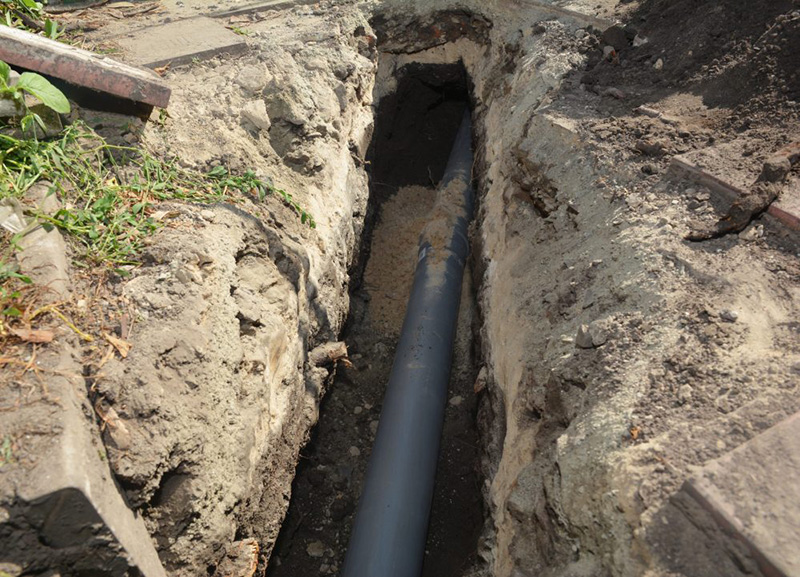
Many homeowners only think about their sewer line when there's a major problem. When problems do occur, there are many questions to consider. Here are some of the most common questions we receive from homeowners about their sewer lines.
How long will my sewer line last?
How long a sewer will last depends on a number of factors including the pipe material, proximity to trees, and the age of the plumbing system. If your sewer line is more than 40 years old, it may need replacing. Even if the home was built more recently, its plumbing may be connected to an older sewer pipe. Whatever the age of your home, having routine sewer and drain line inspections can give you peace of mind knowing that the system is working correctly. If problems are found, it's easier to fix the small problems before they become a major repair.
If the sewer line is damaged, who's responsible for fixing it?
In most municipalities, homeowners are responsible for maintaining the sewer line from the home to the sewer main. In most cases the sewer main is located under the street in residential areas.
Does homeowner's insurance cover sewer line damage and repair?
Most insurance policies do not cover repairs to sewer lines caused by age and wear and tear. We recommend checking your homeowner's insurance policy to see if it covers sewer pipe repair or replacement. Some insurance companies will add a sewer and drain endorsement to your policy to cover losses related to a sewer line backup, and resulting damage to property.
What causes sewer line damage?
The most common problem with older homes built prior to 1980 is damage from tree roots that have invaded the joints of the pipes. Once a pipe develops a small leak from a crack or loose joint, trees will seek out the nutrients inside the pipe and grow into the gaps, eventually obstructing the pipe. Other causes include acts of nature such as erosion, human-caused damage from digging too close to the pipe, and age related deterioration.
How can I prevent damage to my sewer line?
Even if your home is newer, regular video sewer line inspections are good insurance. By inspecting the pipes for bulges, joint failures, cracks and tree root intrusion, you can prevent a costly sewer line backup and extensive repairs.
My sewer line is damaged, what are my options?
In the past, your only option was to dig a trench in the yard to access to the damaged section of the pipe. With today's new trenchless sewer line repair technology, we can often repair a damaged sewer line from inside the line itself. After clearing the obscructed section of pipe we can reline the inside of the pipe from the inside to repair the damage.
Have questions about home sewer lines? Call Grand Lake Plumbing and Heating. We can help answer all your questions.
The Benefits of Whole Home Water Filtration

While Grand County is renowned for it's pristine lakes and rivers, there are a few common water quality issues that lead some residents to drink bottled water or look for ways to improve their home's drinking water. These include hard water where minerals create anunpleasant taste and water spotting, and well water contamination from organic material like e. coli bacteria and chemicals like arsenic.
Here are a few of the benefits of a whole-home water treatment system:
Safer Water
Reverse-osmosis water filtration systems are very effective at removing nitrates, lead, radium, arsenic, and other harmful contaminants.
Environmental Friendly Option
Quality home water treatment systems waste little water and have filters that last a long time before needing replacement. There is far less waste compared to buying bottled water.
Cost Effective
Even if you're drinking only two or three bottles of water a day, installing a whole-home water filtration system will quickly pay for itself.
Protects Your Plumbing
The minerals in hard water causes water heaters and plumbing fixtures to wear out faster. Purified water will prevent sediment build-up in water heater tanks and make clogged shower heads and faucets a thing of the past.
Cleaner Home
Hard water not only stains dishes and shower enclosures, it requires more detergent to effectively laundry and dishes. A water purification system will save time and money on cleaning and laundry.
If your concerned about your drinking water, call Grand Lake Plumbing and Heating. We can perform a water analysis and determine if there are water quality issues that could be improved with a whole home water filtration system.
Slab Leak Warning Signs

A slab leak causes water to collect underneath the foundation of a home. If left undetected for long enough, it can cause enough water to build up that it can damage the basement floor and foundation – the home's slab - by causing it to shift, leading to expensive structural damage.
Slab leaks can be caused by corrosion in the pipe itself, or from damage to the slab from cracks and settling.
Water Seeping From Under the home
If you notice water seeping from under the house, it's important to identify the cause as soon as possible. When a slab leak is suspected, the first step is to rule out other causes, such as leaks from toilets, faucets and other plumbing systems. Next a plumber will need to check the water supply and drain pipes that are inside the concrete slab for leaks.
High Water Bill
A common warning sign of a slab leak is an unexpectedly high water bill. Unless you have had additional guests or are running a sprinkler more often, don't ignore this warning sign. Have a plumber inspect your home as soon as possible.
Basement Wetness
This can resemble a spill on the floor or wet spots that have no apparent cause. Rule out other causes such as pipes leaking above, water heaters and water seepage from rainfall.
If you notice water on exterior walls and there is no obvious cause, like humidity or a sprinkler hitting the house, water from a slab leak could seeping from the inside out.
Cracks in Foundation
Because water under the slab can cause the foundation to shift, cracks may appear on basment floors or on exterior or interior walls.
If you notice any of the warning signs above it's important to have the plumbing system checked as soon as possible. Slab leaks can result in thousands of wasted gallons of water a year and significant damage to your home if left unchecked. Your plumber can check the entire home and eliminate any other causes to determine if a slab leak is present. If problems are found, the water can be turned off and repairs can be performed to prevent further damage.
Preventing Mold Caused By Plumbing Problems
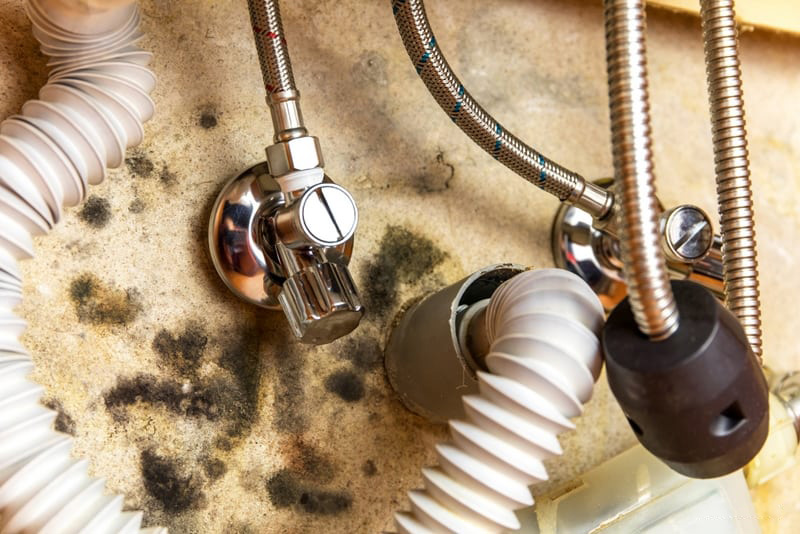
Having mold and mildew growth inside the home can be harmful to your health. Mold can cause allergies and a host of other conditions, including asthma attacks, skin and eye irritation as well as upper respiratory irritation. Mold grows to unhealthy levels when tiny airborne spores land in damp or humid areas of the home that never completely dry out. This moisture is usually cause by structural problems with the home that allow water inside, such as a leaking roof, poor ventilation, or plumbing leaks.
Sources of Mold From Plumbing
Sinks
The cabinets under sinks are a common place for mold and mildew to take hold. Even a small leak inside a small, enclosed space can lead to unsafe levels of mold. The problem often goes undetected because the cabinets are used to store cleaning supplies and other materials that prevent the mold from being seen. If you notice any mold under your sink, thoroughly clean the area with diluted chlorine bleach and have any leaks from valves, supply lines or drains repaired to prevent water from seeping underneath.
Clogged Drains
Clogs in drains can lead to mold growth inside the drain, as well as in the surrounding area when water overflows and is not thoroughly cleaned up.
Standing Water
Standing water in basements can be caused by clogged floor drains, a sump pump that is not working, leaking water heaters and leaking or dripping pipes. Have leaking water heaters and sump pumps repaired or replaced and ensure that any materials that may have been contaminated by mold are safely disposed of.
Bathroom Humidity
Because high humidity and some standing water is unavoidable in bathrooms, the key is proper ventilation and cleaning up excess water on floors. If possiblem, open windows in bathrooms or have a high capacity ventilation fan installed.
Hidden Leaks
Leaks inside walls can go undetected for years. By the time they are noticed , significant mold has grown inside the walls, requiring extensive repairs. The key is to take action when you first notice any sign of trouble. This includes water stains on walls or ceilings, dripping sounds, or un unusually high water bill.
If you're concerned about plumbing leaks leading to mold growth in your home, call Grand Lake Plumbing. We can inspect your home and repair any problems that could lead to harmful mold growth.
What's Performed During a Plumbing Inspection?
What's Performed During a Plumbing Inspection?

Whether you're buying a home or having your current home checked for problems, an examination of the plumbing system is a critical part of any home inspection. While different home inspectors will use various checklist, There are the critical items that are always part of the list. While some checks should only be performed by a qualified plumber or home inspector, as a homeowner, you can perform some of these checks yourself, By inspecting your plumbing you can find the little problems before they lead to expensive system failures or water damage.
Check the functioning of the main water supply valve. When the valve has been closed for a while with no plumbing fixtures being used. Check the water meter. If the meter has continued to run it often indicates a leak somewhere in the supply lines.
It's also good idea to label the valve as "emergency water shut-off" and include instructions for the direction to turn the valve.
Examine plumbing fixtures, supply lines, and drains to ensure the system is watertight. Fill the entire drainage systems with water to the middle of a trip waste overflow of every tub installed to validate if plumbing systems are closely sealed.
Pressure test the piping. Ensure normal working pressure as water is passing through the water pipes. The water supply should run smoothly even at the minimum water pressure requirement. Ensure there is no air in the pipes or banging (water hammer) when operating plumbing systems.
Check the sewer and drainage lines. Assess the sewer lines from property to the main sewer line connection or septic tank. Inspect drainage systems for clogs, pipe damage or excessive corrosion. Perform a video inspection inside the drain and sewer lines to look for pipe damage such as cracks, clogs and tree root intrusion.
Inspect the sump pump. Ensure the pump is not obstructed or excessively dirty. Clear out any debris from the sump pump pit and fill the pit with water. The pump should automatically turn on and remove the water.
Make sure all fixtures have a separate valve to control the water supply.
Check for signs of water damage inside and outside the home. Check exterior drainage, including gutters, flexible hoses, and drains for obstructions that could affect plumbing systems or cause water intrusion into the homeowner.
In homes with a well, check the pressure valve for correct pressure and inspect the well tank for leaks or excessive corrosion. Ensure the well pump is operating correctly and not cycling on/off continuously or too frequently.
Signs Your Well Needs Service
Signs Your Water Well Needs Service
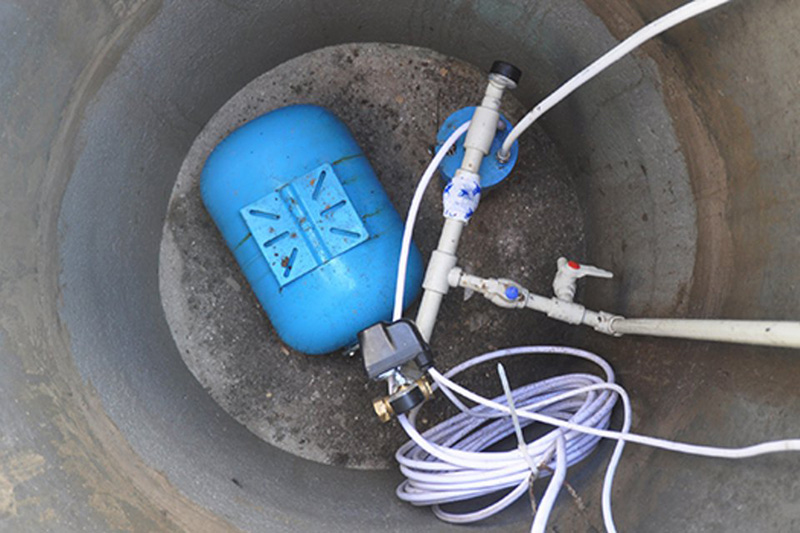
Many homes in Grand County area rely on private wells to supply water for drinking, bathing, cooking, and other uses. An electric pump is used to bring the water from the ground and store several gallons of water in a pressure tank, or well water tank. If the tank loses pressure, it can cause the pump to cycle on and off more frequently. This can lead the pump to fail prematurely, requiring a costly replacement.
Here are the symptoms of a well water tank that is malfuctioning:
- The tank’s pressure gauge indicates low pressure
- The pump cycles on and off frequently
- The pump is running continually
- You are experiencing lower water pressure, especially at fixtures further away from the tank
- Water pressure fluctuated when the pump cycles on and off
- The pump runs less than 30 seconds to pressurize the tank
- You can see water leaks at the pressure tank
- There is visible corrosion on the exterior of the tank
- You notice air in plumbing system when faucets are used
Any of the above symptom may indicate that the well water tank is leaking or its bladder has failed. To prevent damage to the well pump, it's important to have the tank inspected as soon as possible. If leaks are detected the tank should be replaced. Call Grand Lake Plumbing and Sweet Water Pump. Our professional plumbers will inspect the well, diagnose any problems and recommend repairs if needed
.
Signs Your Plumbing System Is Poorly Vented
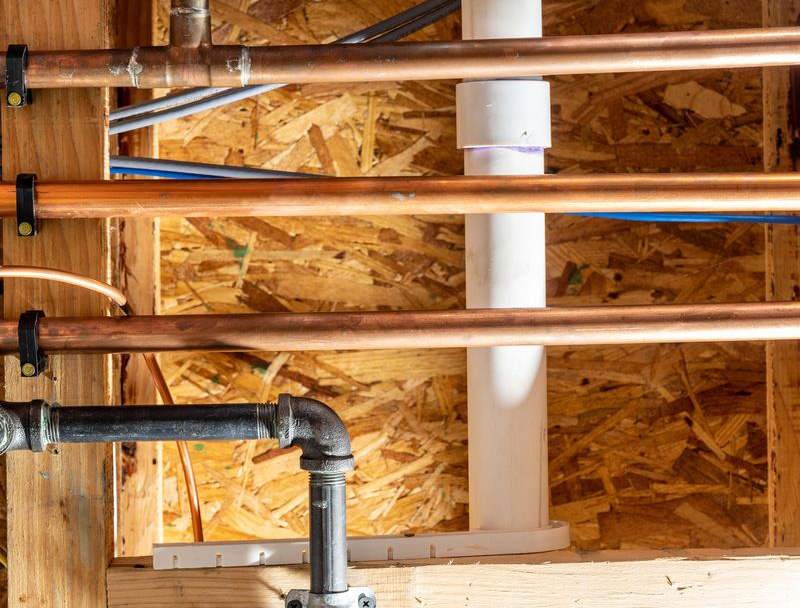
In order for water to flow freely through your home's plumbing system air must be drwan into the pipe to fill the space that's left behind the flow of water as it moves through the pipe. To accomplish this a plumbing system needs to be vented. Because the air needs to enter at a level higher than the water, pipes are run through the roof of the house to allow air to enter the system.
When a plumbing system is not venting correctly, it's often because there's a obstruction in the roof vent. For example, there may be ice accumulation or a bird's nest obstructing the vent pipe. In some cases, faulty venting can occur during a repair or remodeling project when a retrofit is made without understanding how the plumbing system works.
Here are some symptoms you may notice if your home's plumbing system is not vented correctly.
The Toilet Is Bubbling
While air bubbles in the toilet bowl a symtom of a clog, they can also be a sign that the toilet is not fully vented. You may notice that the toilet only bubbles when the washer is working, this is because the washer is draining and preventing the air from reaching the toilet.
The Water Level Is Inconsistent
Is the water level in the toilet inconsistent? If drain lines are not vented correctly water exiting the drains will pull water from the toilet P-trap. It's best to have a plumber inspect the drain first. If the drains are working and there's no clog, then the venting system should be checked for an obstruction.
5 Popular Plumbing Myths
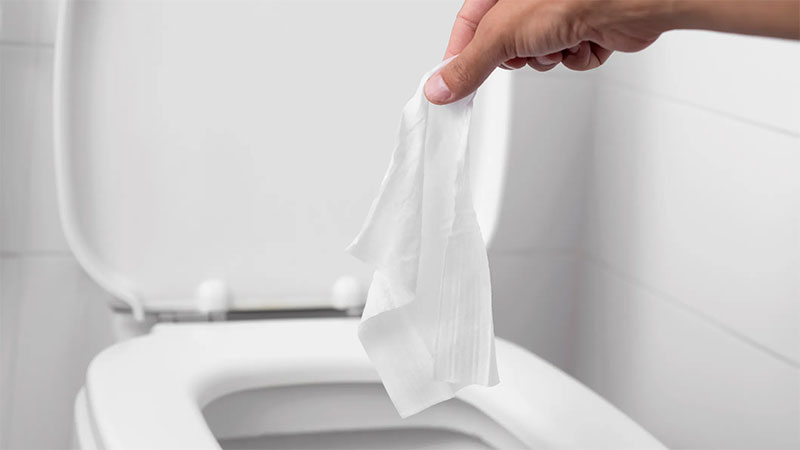
1. Putting Ice Cubes Sharpens Disposal Blades
Grinding ice in a disposal can help remove gunk stuck inside the chamber, but it won't sharpen the blades. That's because a disposal don't have blades, it has impellers with teeth that grind up waste using centrifugal force.
2. You Should Run Hot Water When Using the Garbage Disposal
While it's true that grease dissolves more easily in hot water, once it makes contact with a colder section of pipe further down the drain, it will attach to the pipe more easily along with the waste that follows. By using cold water the grease will remain in a more solid state so it's more likely to make to travel down the drain. Cold water also keeps your disposals motor running cooler, helping it last longer.
3. Placing a Brick In the Toilet Tank Saves Water
While placing a brick in the toilet tank can reduce the amount of water used to flush by displacing some water, it's not a good idea. First, most modern toilets are designed to use as little water as possible. Reducing the amount of water reduces the force of the flush, which can cause plumbing problems, and an incomplete flush. Second, a brick can deteriorate inside the tank creating debris that can cause rubber and plastic parts to wear out faster.
4. But It Said They Were Flushable...
As "flushable" wipes have become more popular in recent years, so have clogged drain pipes. They simply don't break down as well as regular toilet paper. Save yourself a mess and a visit from your plumber ...never flush anything down the toilet other than regular old toilet paper.
5. Using a Water Softener Adds Unhealthy Amounts of Sodium To Water
One of the ways a traditional water softener works is by flushing hard water through rock salt. This does increase the amount of sodium to between 10-300 milligrams per quart, depending on how hard the water is. By comparison, a quart of milk has 488 milligrams of sodium. So the amount of sodium in softened water is quite low. If you desire softened water without any added sodium, consider a reverse osmosis water treatment system.
4 Tips to Increase Water Heater Efficiency

Tank storage water heaters are one of the most energy intensive appliances in the home, second only to heating and cooling systems. By changing some habits and installing a few simple accessories, you can reduce energy consumption from your hot water heater significantly.
1. Reduce Hot water Usage At the Source
One of easiest ways to cut hot water usage is to install water saving low-flow shower heads. The flow rate on a shower head should be no more than 2.5 gallons per minute (gpm). Many water conserving shower heads can reduce flow to as little as 1.6 gpm while maintaining acceptable water pressure. The water savings for a household of four could be as much as 14,000 gallons a year along with greatly reduced energy required to heat the water.
2. Use Pipe Insulation
Even in a small home, as much as 10 percent of the energy used to heat water can be lost in the pipes that supply the hot water. Insulating hot water pipes is an inexpensive way to significantly reduce heat loss.
3. Insulate the Tank
While many new water heaters have good insulation built into the tank wall, many older tanks can allow a lot of heat to escape. The larger the water heater, the more surface area that will allow heat to escape. Prevent heat loss by wrapping your water heater tank in an insulation blanket available from most home supply stores. Some manufacturers recommend against installing insulating blankets on their energy-efficient models, so be sure to read your owner's manual before adding a blanket.
4. Perform Annual Maintenance
Over time, storage tank water heaters can accumulate sediment that reducing heating efficiency. Flushing the tank annually will remove the sediment and make it easer for the burner or heating element to heat the water.
Water and Energy Saving Tips
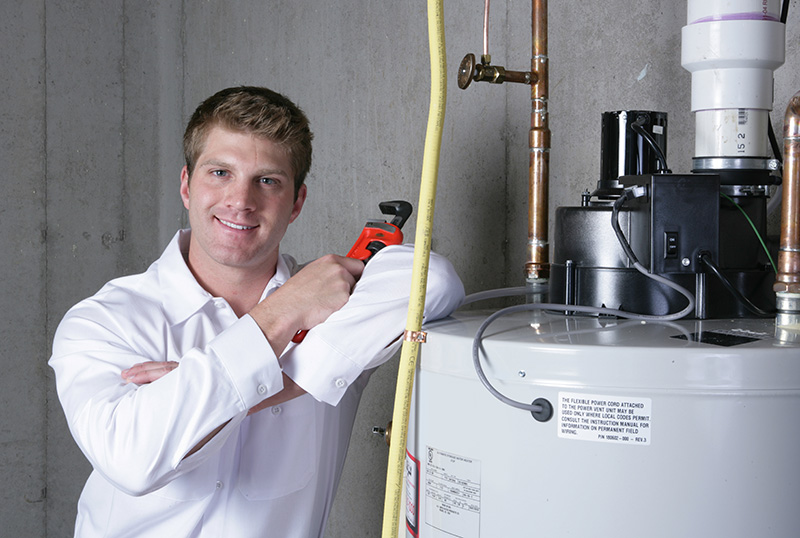
In these days of rising energy costs and drought, many of us are looking for ways to reduce our water and energy usage around the home. Here are a few things you can do to conserve Colorado's natural resources while also reducing your utility bill.
Fix Leaks
Those small faucet and shower drips, running toilets and other little annoyances can end up wasting a lot of water very quickly. Thankfully they are some of the easiest plumbing repairs you can do yourself. Don't forget to check your outdoor faucets for leaks too.
Replace Your Old Water Heater
Replacing a 10-year-old water heater with a newer, more model can save a family of four hundreds of dollars a year, meaning a new water heater can pay for itself very quickly.
For the ultimate in energy-efficient water heating, consider a tankless water heater. Rather than storing hot water, water is heated only when it's needed, and never goes empty.
Turn the Water Heater Temperature Down
Many water heaters come from the factory with the thermostat set at temperature that's much higher than required for most housholds. For most housholds 120 degrees Farenheit is a safe, comfortable setting that provides enough hot water without wasting energy.
Use Less Hot Water
Heating water takes a lot of energy. A simple way to reduce hot water usage in your home it to install low-flow shower heads. Washing laundry on cold water can also save significant energy over time. Choose laundry detergents formulated for cold water can ensure your clothes stay clean.
Have a Plumbing Inspection
Having a regular plumbing inspection is the best way to ensure that your plumbing system is operating a peak efficiency and not wasting water and energy. Grand Lake Plumbing and Heating can perform a comprehensive inspection of your entire home, including the water heater, sump pump, plumbing fixtures, drains and more. You'll rest easier knowing your plumbing system is operating at peak efficiency.
Sewer Odors In Your Home? Here's What to Check

If you notice a smelly sewer odor in your home, there are several possible causes. Here are some things to check:
1. Check the floor drain trap. Without water to block the sewer gas from escaping, odors will enter the room. Pour water down the drain to refill the trap.
2. Check the cleanout plug inside the floor drain. Remove the grate that covers the drain and make sure there's a plug inside the drain bowl. If the plug is missing, sewer gas will be able to bypass the water trap. A replacement plug can be bought at most hardware stores.
3. Check the toilets. When toilets are unused for a long period of time the water in the trap can evaporate. Simply flushing the toilet will refill the trap.
4. Worn toilet wax ring. The wax ring seals the toilet flange to the toilet base. If the wax ring leaks, sewer gas will escape from under the toilet. If the ring is broken, the toilet will need to be removed and and the wax ring replaced. If the toilet is loose on the base, shims can be used to ensure that a rocking toilet doesn't break the new wax ring.
5. Other possible causes of sewer odors include a broken or cracked sewer line or, less often, a loose connection joint in an interior wall. If you've checked the other possibilities above, it may be time to contact your plumber to hunt down the cause.
Have sewer and drain line questions? Call Grand Lake Plumbing, we can help.
5 Reasons Sump Pumps Fail
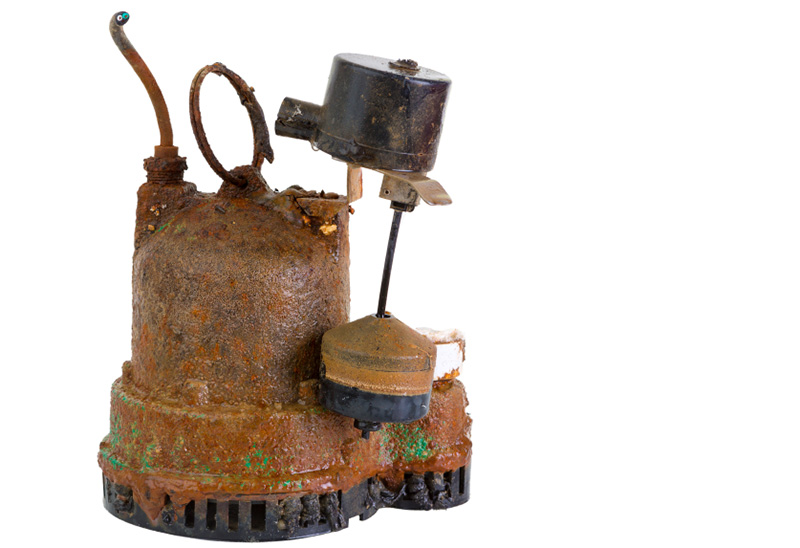
A sump pump is a device that most homeowners never think about, yet it's one of the most important appliances in the home. By pumping water out of the lower level of your home it can prevent major damage to your property. Therefore it's critical that the sump pump be in good working order and ready to handle a sudden influx of water, whether from a flash flood, downpour, or burst pipe.
Here are some common reasons sump pumps fail to work as expected.
1. The Sump Pump Cannot Keep Up
If too much water fills the sump pump pit at once it can become overwhelmed. You can reduce this risk by ensuring that your sump pump is of high quality and powerful enough to handle a significant volume of water. In some cases a single sump pump just isn’t enough to handle a basement flooding event.
2. The Sump Pump Is Not Installed In the Right Location
The basement drainage must channel the water into the sump pump pit. If the pitch of the floor isn't diverting the water correctly, the pump will not simply not be able to remove the water. Have the drainage system inspected and fixed if needed. If there is no drainage system, have one installed.
3. The Pump Has Become Dirty
A dirty sump pump is more likely to malfunction. Dirt can prevent the float switch from working or clog the discharge line. Keep the sump pump clean by installing a tight lid over the pit and testing it regularly to ensure the float switch in good working order. The pump should be mounted on a pedestal to keep it from resting on the bottom of the pit.
4. The Discharge Line Is Clogged or Frozen
Sump pumps have a discharge line that removes water from your basement. Ensure that the line is not obstructed or in a location that could cause it to freeze.
5. The Power Fails
It's an unfortunate coincidence that many strong storms lead to power outages. Unless your home has a backup generator your sump pump is not going to work when the power goes out during flooding rainstorm. A safe option is to install a battery backup sump pump that can keep running if the power to the home is lost. A battery backup unit can also be installed next to a conventional sump pump for greater reliability.
1. Clogged Toilet
After a running toilet, the most common toilet problem is the dreaded clog. Clogs are typically caused by flushing too much toilet paper or putting items down the toilet that should go in the trash can instead. This includes sanitary pads, q-tips, and even wipes that are labeled as "flushable". Clogs tend to occur in homes with older plumbing systems, although newer low-flow toilets can experience clogs if you're not careful with what you flush.
Sometimes a second flush can clear a clog out, but other times you’ll need to use a plunger to push the clog through the trap. Did you know there are plungers specifically designed for toilets? Make sure you use the right kind for plunging your toilets.
2. Overflowing Toilet
When a clog is severe enough that water pressure cannot push it through, an overflow is likely to occur. This can result in a very unpleasant mess. If a toilet plunger doesn’t clear the clog, a toilet snake is the next best option. A toilet snake can reach the drain by bending its way around the trap to break up the clog.
3. Running Toilet
Running toilets are a very common plumbing problem. Unfortunately, running toilets are often ignored and end up wasting a lot of water.
Running toilets are typically caused by one of these three problems:
- Old flapper
- Chain caught under the flapper
- Overflow
4. Weak Flush
A weak flush is caused by a lack of pressure or water flow in the pipe leading into the toilet. First, ensure that the toilet water valve is completely open. Next, check that the water level in a tank is not too low, which can reduce the power of the flush.
If these suggestions doesn't fix the problem, call Grand Lake Plumbing and Heating for service.
5. Leaking toilet
Like a running toilet, a leaking toilet can waste a lot of water in a short period of time. You can check for a leaking toilet tank buy putting a few drops of food coloring in the tank. Wait about 10 minutes and check to see if the color of the water in the bowl has changed. If it has you have a leak that should be fixed.
Sump Pump FAQ

Sump pumps are an essential plumbing appliance that most homeowners never think about...that is until it fails during heavy snowmelt or a summer downpour. If it goes undetected for even a short period of time, water damage can be extremely costly to repair and cleanup. Your home's sump pump is the first line of defense for preventing water damage.
Here are a few things to know about sump pumps, including some tips for ensuring yours is working when it's need the most.
What is a sump pump?
A sump pump is installed in basements and crawlspaces to automatically keep the space dry and prevent it from flooding. Sump pumps are placed in enclosures called sump pits that are designed to collect the water so it can be removed by the pump. A typical sump pit measures between 15 and 18 inches across and about 2 feet deep.
How does a sump pump work?
During a heavy rainstorm or snow melt-off when water accumulates in the lower level of the home, the sump pit will fill with water. When the water level reaches a preset level on the pump, a float switch activates to automatically turn on the sump pump. The pump forces the water out oof the home through a drain line. A check valve prevents the water from flowing back into the pit.
Are there different kinds of sump pumps?
There a several types available:
Submersible Sump Pump: As the name implies this kind of pump is completely submerged in the water of the sump pit. Being under water helps prevent the pump from overheating if it needs to run for long periods of time. This kind of electric-operated pump combines the pump body and motor in one enclosure.
Pedestal Sump Pumps: This kind of sump pump has its motor mounted on top of a long tube that sits above the sump pit where it is less susceptible to water damage. These are typically used for smaller sump pits where a submersible sump pump would be too large to fit.
Backup Sump Pump: Because power outages and flooding often occur at the same time, a backup sump pump runs off of a battery so it can keep running if the power goes out. They are sometimes installed as a secondary pump for the primary pump that is connected to the home's power supply.
Combination Sump Pump: These combines a primary pump (submersible or pedestal model) with a battery-operated backup pump in one system. If the primary pump malfunctions or there is a power failure, the backup pump will automatically activate.
How do I maintain my sump pump?
Regularly testing and maintaining your sump pump is essential for ensuring that it's ready to go when the water rises.
First, clean out the sump pit to remove anything that could obstruct the operation of the pump.
Second, test the pump several times a year by pour enough water into the sump pit to ensure that it turns on and removes the water.
Finally, clean the filter screen of debris that can clog and damage the pump.
If your sump pump has stopped working give Grand Lake Plumbing and Heating a call. We can test the unit and repair it if possible, or install a new sump pump of it needs replacing.
-
"Thank you for the service. I want to let you know the technician Sawyer was professional, thorough and fixed our problem in less than 1 hour. I will recommend GL Plumbing to others."– L.M. 10/25/16
- 1
- 2
- 3
Communities We Serve
Grand Lake CO 80447
Granby CO 80446
Hot Sulphur Springs CO 80451
Kremmling CO 80459
Parshall CO 80468
Tabernash CO 80478
Winter Park CO 80482
And Many More Communities In Western Colorado

